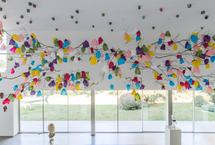"Is there a method for discovering the research?
Is there a laboratory to invent the discovery?
How did they invent the invention?
Who are the geniuses who populate the wonderland?
Isn't the beginning of things something that hides things?
I would like to make sense of the method that governs our senses.
What makes some people go out of their boxes?
To move away from their villages?
To push the gates of distant cities?
What forces some to lurk around borders?
to defy the fire of the flames and rub the thorns of the forbidden towers?
Why are so many still braving deserts, seas and oceans beyond the horizon?
No one knows why some are born in the South and others in the North,
No one will be able to tell why we're here and not somewhere else, right?
Will we ever know the cause of the conquests?
Will we ever know the purpose of our ambitions?
Will we ever be human?
To defeat evil is to tame the animal that sleeps in us and
only a real man will win our battles.
Bossa Bossa simply on the way to the next fights.”
pmt@ Ghent, December 21st 2019
With these words Pascale Marthine Tayou (b. Nkongsamba, Cameroon, 1966) presents his first solo exhibition at a Spanish art gallery, a project curated by Fer Francés at the Galería Javier López & Fer Francés in collaboration with Galleria Continua. The show opens to coincide with this year’s ARCOmadrid, a moment of special importance in Madrid’s cultural life.
Bossa Bossa brings a series of recent works to our exhibition space, along with works created in situ, constituting an immersive installation that embodies the work of an artist who defines himself as an explorer. The phrase used in the title means "victory, victory" and refers to a cry of celebration and encouragement shouted by African migrants when they succeed in crossing the fences that separate them from Europe, a cry that is answered and repeated by those who remain on the other side of the barriers.
A self-taught artist, Jean Appolinaire Tayou abandoned law studies to dedicate himself to art and adopted his parents’ first names, giving them a feminine form by adding a final “e” in order to distance himself ironically from the importance given to authorship and the assigning of masculine and feminine roles—a shift that can also be applied to any reductive attempt to interpret specific geographical or cultural origins.
Since the beginning of the 1990s he has aimed to reflect his experiences as an observer of different ways of life, of the complexity of human relationships (sometimes affected by the political, economic and social crises that impinge on his world), of the environment and the impact of humanity’s hand on nature, of the cultural differences between Africa and Europe, of the flow of migrants, of the opposition and necessary unity of contraries (wealth-poverty, power-submission, life-death, beauty-danger, purity-corruption).
In Tayou we see a multidisciplinary and prolific artist who expresses himself through a wide diversity of materials, media, and formats—including sculpture, installation, photography, drawing, and video—where he uses an aesthetic of accumulation, based on reusing objects from daily life picked up during his travels—objects already used, discarded, and thrown away by consumer society—which he gives new life, dignifying them, reversing the process of degradation and endowing them with a kind of spiritual aura, sublimating this rubbish as an aesthetic experience.
He currently lives and works between Belgium and Cameroon, combining references to his African origins with elements from his life in Europe, highlighting his capacity to engage with a reality in permanent change. In multiple hybridizations, he mixes the past and tribal identity, the idea of the global village, and traces of late post-colonialism, speaks of the local and subjective with a critical rawness and a poetic power of synthesis that are both universal and contemporary. His installations are heterogeneous, colouristic, monumental, and energetic, like travel notebooks on a grand scale.
Bossa Bossa is presented as a museum-style exhibition in its dimensions and concept. It includes some of his most emblematic images, as in the Colonne Pascale, an icon of domestic routine made up of pots piled up in the style of a totem, like Brancusi’s endless column. These household utensils are a symbol of protest, as are the cobbles in Colorful Stones, which look back to times of social unrest and conflict against the forces of order and anti-revolutionary groups. His compositions executed with coloured chalks evoke the world of infancy, and the Poupées Pascales are halfway between popular carving and souvenir, fragile and robust at the same time, as also are his Masks and the wooden sculptures of Labyrinth Colonial.
Pascale Marthine Tayou’s work has become known to a wide international public through its inclusion in such important art events as Documenta 11 in Kassel in 2002 and Venice Bienales in 2005 and 2009, as well as, for instance, in Havana (1997 and 2006), São Paulo (2002), Istanbul (2003), and Dakar (2018). He has also exhibited at museums around the world including the Serpentine Gallery in London (2015), MACRO in Roma (2012), Mudam in Luxembourg (2011), Malmö Konsthall in Sweden (2010), and S.M.A.K. in Ghent (2004). His work is part of the collections at Tate Modern in London, the Centre Pompidou in Paris, and the National Gallery of Victoria, and in Spain it has been shown at CAC Málaga (2016) and at the Fundación NMAC in Cádiz (2006).
